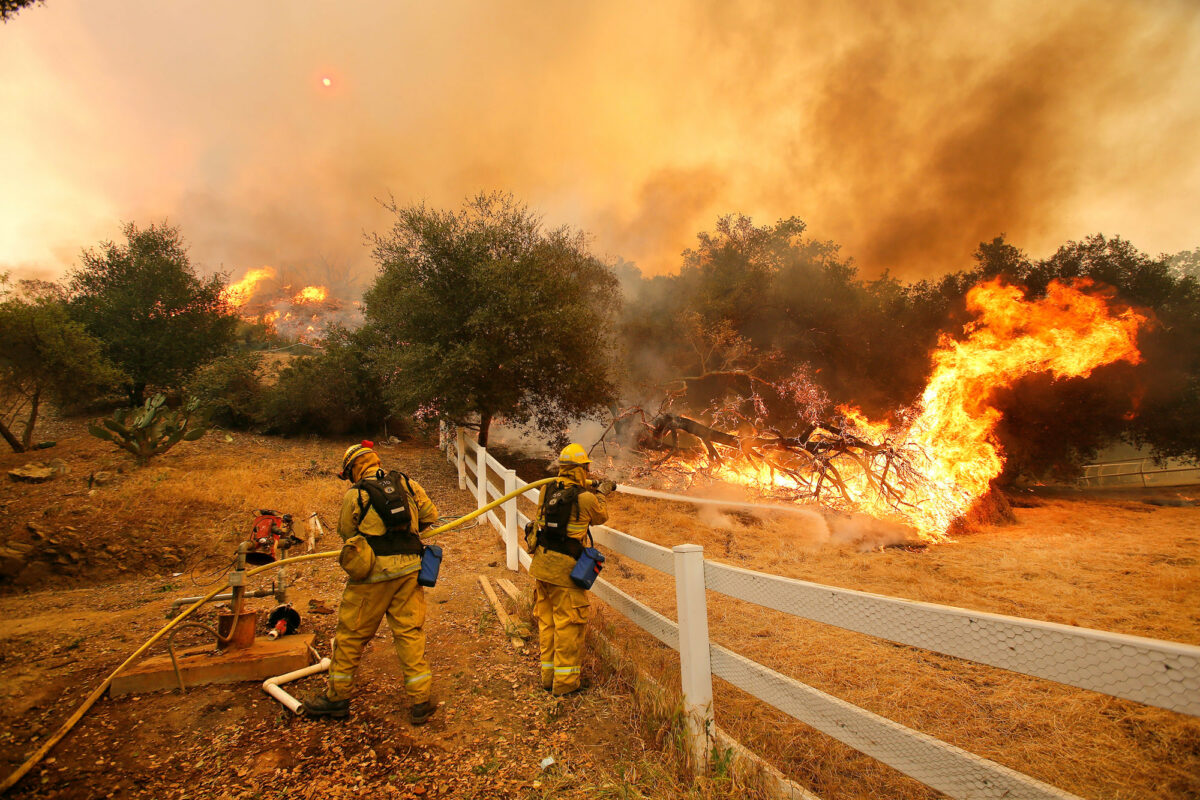Thousands of emergency workers in California struggled to fight a rapidly growing wildfire near Yosemite National Park on Sunday as President Joe Biden continued to mull whether to declare a national climate emergency, a move that campaigners say is needed to respond to the immediate threat of extreme weather and lay the groundwork for a livable future.
Dubbed the Oak Fire, the California blaze was completely uncontained as of Sunday afternoon, having tripled in size since it began on Friday. The fire has now burned more than 14,000 acres, making it California’s largest wildfire of the season.
“Explosive fire behavior is challenging firefighters,” Cal Fire said in a statement Saturday, characterizing the blaze as “extreme with frequent runs, spot fires, and group torching.” Gov. Gavin Newsom declared a state of emergency for Mariposa County on Saturday as authorities urged thousands in the potential path of the fire to evacuate immediately.
Climate scientists have long warned that drought, extreme heat, and other conditions driven by planetary warming could make wildfires more frequent and intense. A United Nations report published earlier this year raised the specter of an ever-worsening “global wildfire crisis” if governments across the globe—particularly the rich nations most responsible for carbon emissions—don’t radically alter their energy policies and phase out fossil fuel use.
California is hardly alone in experiencing devastating wildfires in the present. Reuters reported Sunday that “Greek firefighters battled wildfires on the island of Lesbos for a second day on Sunday as well as new fires in the western Peloponnese and in northern Greece, evacuating nearby settlements as a heatwave set in.”
“Temperatures hit 40 degrees Celsius (104 Fahrenheit) in parts of Greece on Sunday as a heatwave that has hit other parts of Europe spread east and was expected to last for most of the coming week,” the outlet noted. “In the north of the country, a wildfire continued to ravage a pristine forest near Dadia, a natural habitat for black vultures, burning for a fourth day as authorities struggled to contain its destruction.”
Firefighters across Europe are fighting wildfires as a heatwave sweeps across the continent.
France has evacuated thousands of people with fires also spreading in Spain, Croatia and Greece.
Read more: https://t.co/VnwrLWgsoI pic.twitter.com/VwIiOKpxfQ
— Sky News (@SkyNews) July 19, 2022
Amid what experts have described as mounting real-time evidence of the dangers of climate inaction, Biden is still in the process of deciding whether to declare a national climate emergency, a step that would free up key federal authorities and resources to accelerate the country’s renewable energy transition.
Last week, in a speech in front of a shuttered coal plant in Massachusetts, Biden pledged action to protect U.S. communities from scorching heat and other impacts of the climate crisis. The president also vowed to expand offshore wind development.
But while he said climate change represents “a clear and present danger,” Biden did not use his speech to declare a climate emergency, sparking backlash from environmentalists who have been pushing him to do so since last year.
“The world’s burning up from California to Croatia, and right now Biden’s fighting fire with the trickle from a garden hose,” lamented Jean Su, director of the Energy Justice Program at the Center for Biological Diversity. “Saying we’re in a climate emergency and declaring one under the law are totally different things. Declaring a climate emergency will unleash the full force of Biden’s executive powers to combat climate chaos and signal the climate leadership we so desperately need.”
In an interview with the BBC on Sunday, U.S. climate envoy John Kerry said that Biden is weighing a climate emergency declaration as Congress—obstructed by a fossil fuel industry ally in the Senate—fails to act and as the U.S. Supreme Court takes aim at the federal government’s regulatory capacity.
Facing growing pressure from progressive lawmakers and climate organizations, Biden said last week that he’s “running the traps on the authority that I do have” and “will make a decision on [the emergency declaration] soon.”
Sen. Elizabeth Warren (D-Mass.), one of nine senators who implored Biden to issue the declaration last week, said Sunday that the move would “unlock powerful tools to help safeguard our planet and make our economy stronger.”
“Climate change is the biggest existential threat facing our planet,” Warren added. “That’s why I joined my colleagues in urging the president to declare the climate crisis the national emergency that it is.”
